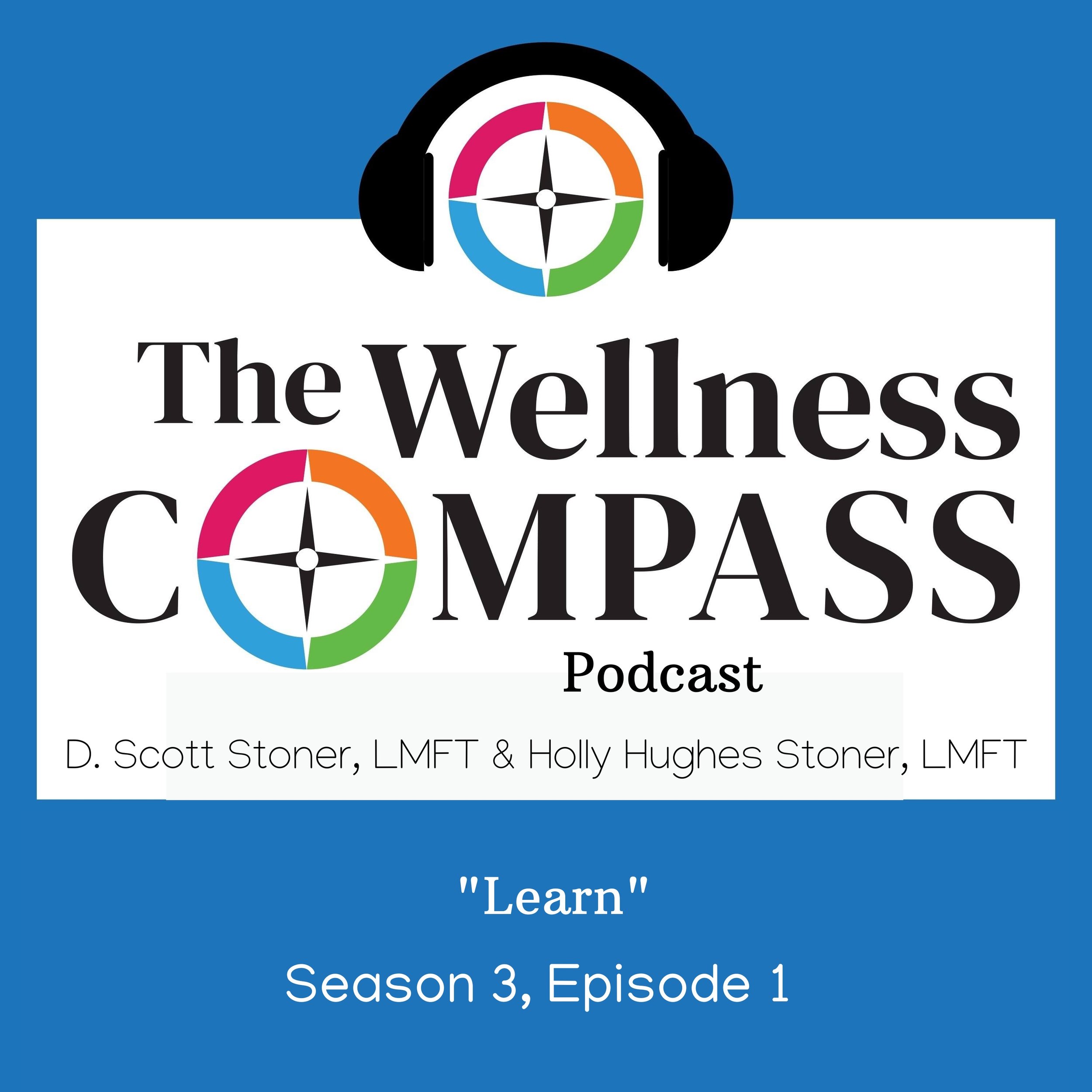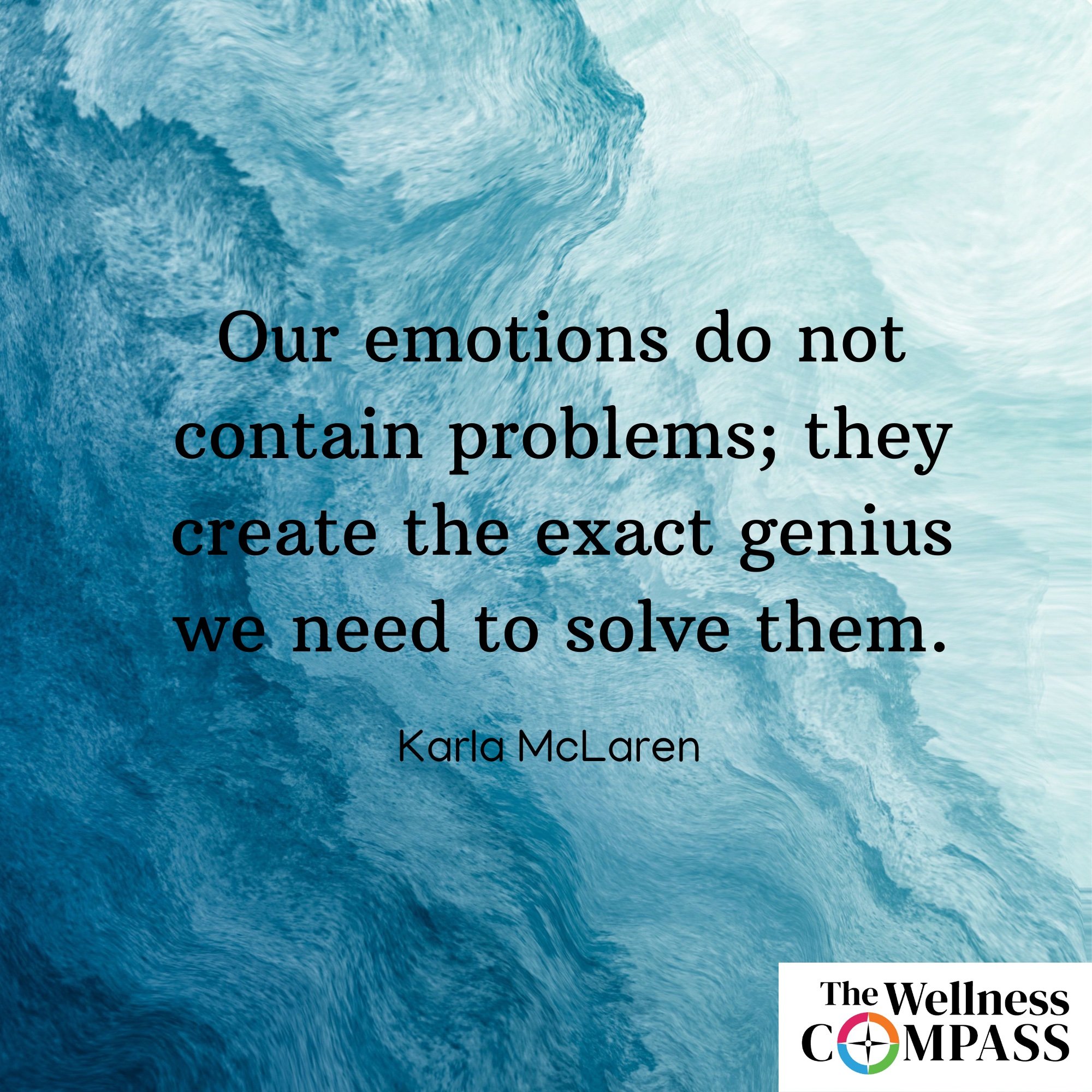Wellness
What follows is a transcription of this week's 10-minute Wellness Compass podcast episode entitled "Wellness." We invite you to listen to this ten-minute episode by clicking r by clicking HERE to listen to it on our website. (You can also listen in any podcast app, Apple, Google, Spotify, by searing for Wellness Compass--and be sure to subscribe.)
Listening gives the full experience of the emotions and tone of what is being said, which is difficult to capture in a transcription. The spoken word is different than the written word. We are happy to provide this transcript for those who prefer to read rather than listen.
Holly: Welcome back to the Wellness Compass podcast. I am Holly Hughes Stoner, and I'm here with my husband, Scott Stoner. We are both marriage and family therapists and we are in our third season of this podcast. This is our second episode of season three. And this year, what we've decided to do is choose a word, a single word, that we want to focus on during our episode, one that has something to do with wellness and gives us something to think about so we can all be, you know, kind of be working towards greater wellness for ourselves.
And today and next week’s word are going to kind of go together. We're going to use the title of this podcast, Wellness Compass, and kind of explore first of all, what we talking about when we say wellness. And then next week we'll talk about why do we use that word compass. What does that have to do with anything? So just like I said this show today will be about wellness. Scott, do you want to talk a little bit about what we're thinking about when we talk about that?
Scott: Sure. Last week we talked about the word “learn” as everyone was going back to school and starting a new kind of school year, that is the season we are in. We talked about learn then and so that's a natural segue into wellness for this week because wellness to me is about continuing to learn as we go through the life cycle.
What does it mean to be well, what are the things that I can do today to enhance my wellbeing? Everything we do with all of our materials, not just our podcast, but our overall nonprofit Wellness Compass Initiative, is equip people with the awareness, the intention, the education, the tools to both become more aware of their wellbeing. We do this in eight areas of wellness, always helping others to decide what they can do to grow and enhance their well-being. So we're kind of lifelong learners. You see wellness is a journey. It's not a destination, it's an ongoing choice and an ongoing lifestyle. You know, we often refer to our wellness as a garden. It's something that we need to continue to tend to so we can continue to grow healthy and beautiful things.
Holly: Yeah, In fact, so we talk about watering areas of wellness, we also talk about pulling out weeds. You know, there are things that can crowd out good plants. And we also, if we have some bad habits, those would be like the weeds. There might be some weeds we want to get rid of to allow for greater wellness in our lives. So in terms of wellness, which is our word this week, I've got a list of five things that are all part of everyone's day to day activities. And the more we practice and do some of these simple things, the more wellness we will create.
The first one is connecting with other people, both developing and nurturing relationships that you have. Think of an old friend maybe you haven't talked to for a while. You know, maybe even give them a call instead of texting or messaging them. People laugh at me. They say I'm the only person that still calls anybody, but I like to hear people's voices. If I just message them I don't feel connected to them, really.
Scott: Some of the people I've been doing wellness coaching with have talked about how they have gotten into some bad habits or not bad habits really, they just got out of the habit of connecting with others because of COVID. Now they're realizing they haven’t stayed connected. They have to kind of, you know, redevelop some of those connecting muscles. They have to put themselves out there either to restore some connections or maybe try some whole new connections. But social and emotional connecting community is essential to wellness.
Holly: So, you know, if you're a person that is feeling that, maybe you need some more connections you might ask yourself, “What kinds of things can I do to better connect with others? How could I reach out? How could I connect with other people?”
Scott: The most common coaching question we always ask is “What's one thing you could do this week to enhance that dimension of wellness?” So, it’s a good question to ask here.
Holly: Exactly. Okay, so that's the first one Connect. The second one is being active. And so some people think, Oh, I've got to go walking or running but I don't really like that. But the most helpful idea of being active is finding something that you like. Maybe it is walking or running, but maybe it's swimming, maybe it's water fitness. What active thing do you love doing?
Scott: I know you love water fitness!
Holly: Oh my gosh, it is so much fun that it doesn't feel like a chore when I do it because I like it so much. That's the key. Yes, because it really helps us physically and mentally. So it’s really a two for one.
So connecting, being active. And the third one is to keep learning. First of all, it's fun as we human beings are learning machines, I believe. But we also get a sense of achievement when we learn something new. We can share it with other people. It can make us more confident. To learn something some people sign up for a class, maybe they have found some online thing they can do, maybe they found something going on at their local library, but just find something to keep learning. What have you always wanted to lean more about? Learning is another really great way to continue to advance your wellness.
A fourth one is giving back. And this is like being a volunteer, helping or giving to other people. It could be as easy as just giving somebody a smile.
Scott: And exactly. We have it as a wellness component in our wellness compass as one of the areas, spirituality. And giving back to me touches on that. It's about a sense of purpose, a sense of meaning, a sense of giving back to the world again. I said earlier that wellness is a lifelong journey, and we notice this especially in the second half of life, purpose and meaning and spirituality, giving back to the world becomes an essential ingredient in our wellbeing.
Holly: Absolutely because if you don't feel like you've contributed, it can make people feel kind of bad or even depressed. And there are places everywhere in the world that need help, so there's room for everybody to have something to give. And then the last one is being aware of the world around you, taking notice of it, being aware of your feelings, your thoughts, just taking notice of the world within you and around you. This could even include, I'm thinking right now about the seasons changing, just getting outside and being observant, taking in the moment can be very meaningful.
Scott: And to this, you know, Socrates said over 2000 years ago, the unexamined life is not worth living. I mean, that sounds a little harsh, but it, you know, got our attention and we still remember the quote.
But our point is that you get to continue to grow in self-awareness and do it with self-compassion. That's one of the key things I want to say to each of our listeners and to myself, that because often when you think about wellness, when people think, “Oh, you know, I haven't been doing this, I haven't known that,” and it becomes kind of negative and critical and shame based. And that's the last thing we want. We don't want to have an ounce of that.
Wellness is about self-compassion. It's about self-care, it's about self-love. It's like if you think of someone, a friend or a child or a partner or someone you love and really care about, you want to nurture their well-being. You don't want to lecture them, you don't want to judge them. You want to you approach them with compassion.
We want to offer that same compassion to ourselves because that is how well-being, that's part of well-being is self-love and self-compassion so we can grow into the people that we want to be. But self-awareness is such a key part of that. That's why we all of our programs involve some kind of guided self-assess, self-reflection. If you were going to grow a garden and you had a yard or you had a plot that you were renting somewhere, you would need to take an inventory. “How is the soil? What does the soil need? What shape is the soil in right now? Does it need weeding? Does it need some nutrients? Does it need some fertilizer? How are we going to get sunshine and water?” You start with, you know, looking at what is, and then how do I grow from there? And what do I want to grow?
A very common question I ask a person I’m coaching is, “What is one thing that either if you have more of, or did less of right now that would enhance your wellness?” And you know what? Every single person always has an answer. You have an answer to that question too. And I invite you to think about that question. What you can do either more of or a less of to enhance some aspect of your wellness?
Holly: And I'm just going to repeat those five things because they might help you think about what's one thing you could do. One of the things that I really like about these is that none of them really cost anything. You can do all of these at no cost. Maybe they will cost you time, and even some energy. But that's it.
So the first one is connecting. Connect with others. Being active. Keep learning. Give to others. and Take Notice.
Scott: Speaking of connecting with others, we are so glad to be connected with you and that you're connecting with us. You can do that through our Facebook page as well, The Wellness Compass Facebook Page. Just search for Wellness Compass. We will post this episode there as well as the transcription of this podcast. And we will and you can comment and let us know what that one thing is that you're going to do to water your well-being.
So again, we are honored to be on this journey with you. You can reach out to us through our website, wellnesscompass.org. Next week we will talk about the word Compass which will be our word for next week.
Until then may you be well, may you be happy, maybe healthy, and may you do one thing to enhance your own wellness this coming week.
****************************************************************************************************************
And speaking of podcasts, Scott has launched a new podcast that is just him speaking about a topic that he is passionate about, the integration of spirituality and wellness. This newly launched LIving Compass Podcast can be found HERE or in your favorite podcast app.




















